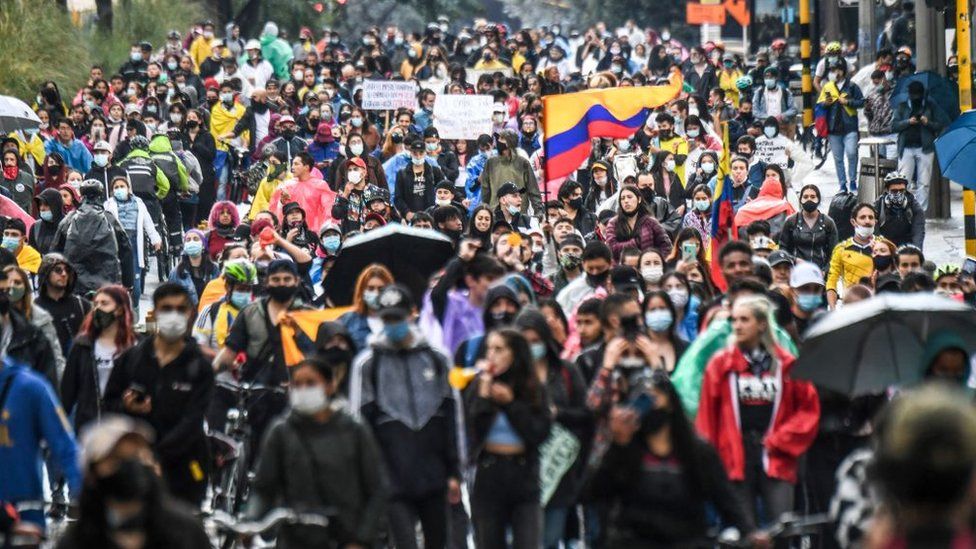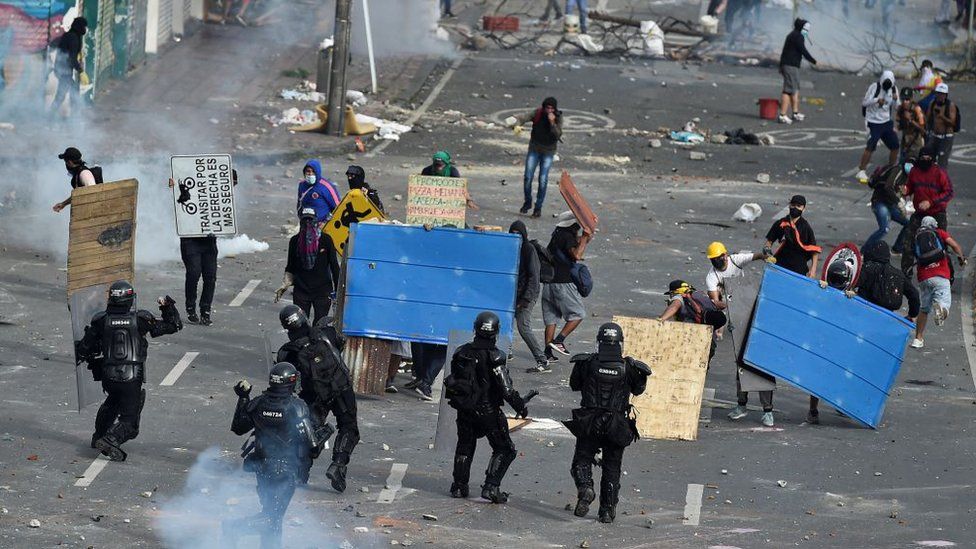
This article is more than
4 year old
Mayor Claudia López requested the help of the army to guard the stations, calling the violence "inadmissible".
Fresh nationwide demonstrations are expected later on Wednesday.
There have been at least 19 confirmed deaths since the protests started and the UN has urged the security forces to refrain from using firearms.
Colombia's ombudsman said on Tuesday that 18 of those killed were civilians and one was a police officer.
More than 800 people are reported to have been injured in clashes between the police and demonstrators while more than 80 others are reported as missing.
Mayor López said 15 immediate response police commandos, known as CAI for the initials in Spanish, had been attacked. CAI are small police stations which can be found dotted across neighbourhoods and often consist of little more than a room or two.
One CAI was set on fire with 15 officers inside, who managed to escape alive.
Overall, 30 civilians and 16 police officers were injured in Bogotá on Tuesday, Mayor López said.
There were also reports of incidents in other cities including Cali, where the clashes have been at their most violent.
The demonstrations started on 28 April and were initially in opposition to the tax reform that the government said was key to mitigating the country's economic crisis.
The rallies were organised by the biggest trade unions, but were also joined by many middle-class people who feared the changes could see them slip into poverty.

The proposal would have lowered the threshold at which salaries are taxed, affecting anyone with a monthly income of 2.6m pesos ($684; £493) or more. It would also have eliminated many of the current exemptions enjoyed by individuals, as well as increasing taxes imposed on businesses.
On Sunday, President Iván Duque announced he would withdraw the bill. But that was not enough to stop the protests, which have become a broad call for improvements to Colombia's pension, health and education systems, as well as against what demonstrations say is excessive use of violence by the security forces.
Some of the most violent incidents have been reported in the western city of Cali, the country's third largest. Roads have been blocked and dozens of police, public and private buildings attacked. The commander of the army has been sent to the city to co-ordinate the security efforts.

The United Nations' human rights office said on Tuesday that it was "deeply alarmed" by the violence against protesters in the city.
It said that "police opened fire on demonstrators" in Cali on Monday. While no official figures have been released yet, local media say at least five people were killed.
Kevin Reyes, a community leader, told BBC Mundo that "hooded police and military officers fired using semiautomatic weapons and rifles" during a demonstration. "There were children and mothers," he added.
Experts say other factors have contributed to the unrest: this is one of the most violent cities in the country, located in a region affected by decades of conflict waged by paramilitary groups and drug traffickers. They also point to the high number of weapons that are known to be in the area.
"There are civilian groups calling for de-escalation of violence," said Katherine Aguirre, a human rights expert. "But we've also seen groups of citizens who have started shooting from their homes, vigilantism stimulated by the flow of weapons in the city."
The government has blamed the violence on left-wing rebels. It says it is being stoked by members of the National Liberation Army (ELN) as well dissident factions of the Farc guerrilla group, who have not accepted the 2016 peace deal and have refused to disband.
"The violence was systematic, premeditated and financed by criminal organisations," Defence Minister Diego Molano said.
Police officials say, in many cases, it was their officers who were attacked as they tried to prevent "criminal elements" from looting stores and torching buses.
Meanwhile, President Duque said the government was ready for national dialogue and announced the creation of a "space to listen to citizens and construct solutions".
It is not the first time that anti-government protests have turned deadly in Colombia. Most recently, in last September, at least seven people were killed in protests triggered by the deadly tasering of a man by police in Bogotá.